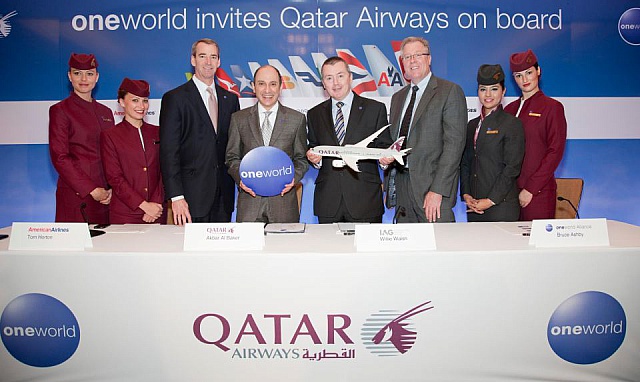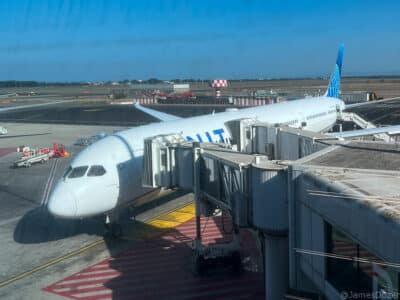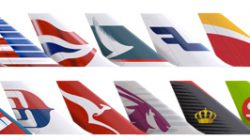
The cat is out of the bag: after months of speculation, Qatar Airways will be officially joining the Oneworld global alliance in the next 12-18 months, according to a press release issued by yahoo! news just minutes ago. Qatar’s official election as a oneworld member delegate was announced today at a press conference in New York, the global headquarters for Oneworld, and attended by Qatar Airways CEO Akbar Al Baker, Oneworld CEO Bruce Ashby, International Airlines Group Chief Executive Willie Walsh, and American Airlines Chairman and Chief Executive Tom Horton. The carriers’ Facebook page was the first source to leak the information around 1:30 PM Eastern Standard Time.
Qatar Airways, based in Doha, is the official flag carrier in the Arab emirate of Qatar, and is wholly owned by the Qatar government. It was launched in 1997 and has propelled into becoming one of the world’s fastest growing and highest quality airlines, ranking at #42 in terms of total weekly seats among all global carriers, ahead of Singapore Airlines and behind AirAsia, according to CAPA. It boarded 15 million passengers in 2011, and currently operates 111 aircraft, comprising of Boeing 777s, Airbus A340-600s, Airbus A330s, and Airbus A320s. It also has several Boeing 787s Airbus A380s, Airbus A350s and Airbus A320neos on order.
Like fellow Middle Eastern rival carriers Emirates of Dubai and Etihad of Abu Dhabi, Qatar Airways is notable for having grown its network and fleet at a faster rate than the majority of its global competitors, and benefited heftily from an economic boon in its native country thanks to the oil and gas industry. Part of the reason why Qatar’s entry into Oneworld is so groundbreaking is that the major global alliances had traditionally shunned Middle Eastern carriers in the past, but that strategy has clearly become dated.
The implementation into Oneworld will coincide nicely with the opening of the New Doha International airport (NDIA) scheduled to open in 2013. British Airways will be sponsoring Qatar’s membership into the alliance.
The news comes hours after another Etihad announced a new alliance/partnership with Air France-KLM today, entailing a new historic agreement to code share on flights across the airlines’ networks, as the “first phase” of a much larger strategic partnership to commence on October 28. The agreement would “see Etihad Airways and Air France-KLM offering joint codes on destinations in Europe, the Middle East, Asia and Australia,” and “propose integration of frequent flyer programs” with “reciprocal ‘earn-and-burn’ privileges for 1.5 million Etihad Guest members and 21 million Air France-KLM Flying Blue frequent flyers across the combined networks.”
Recent Oneworld joiner airberlin will also be included in the Etihad-Air France-KLM partnership as well, as Etihad owns a stake in airberlin.
All in all, such inversions were unthinkable in the global aviation world a few short years, if not months, ago. Older network carriers from Europe, Asia and Australia were always quick to fire the major Gulf carriers for possessing competitive advantages that subverted the traditional hub-and-spoke system, such as unfair government subsidies and lower labor costs.
But the world has changed. It could be described as a “domino effect:” once the first one fell, being the Emirates tie-up with Qantas Airways, the others were quick to follow suit.
Of the three major global alliances, Oneworld, Star Alliance and Skyteam, the former is the most permeable to alliance “re-think,” in other words, chasing after new operating philosophy that permits multiple arrangements with partners both within and outside of the alliance. Rather than follow a centralized strategy that upholds conditions and restrictions universally for all members, Oneworld instead appears more relaxed about allowing individual carriers to pursue options that deliver the greatest commercial value to each individual airline.
In other words, each carrier has more freedom and more power.
So far, there appear to be no signs of bad blood developing. For instance, when Qantas announced it was terminating its 17-year joint services agreement with British Airways in March in favor of a new agreement with Emirates, a long-time BA rival carrier, IAG CEO Willie Walsh appeared wholly supportive of this decision (IAG is the parent holding company of British Airways and Iberia Airlines of Spain). Walsh acknowledged that the impetus for Qantas’ strategic shift was due to the problems it was having in serving the European market, which could be resolved by forming a partnership with a major Gulf carrier.
Similarly, Qantas CEO Alan Joyce seemed to back IAG’s sponsorship of Qatar into Oneworld, despite the fact that Qatar and Emirates are regional rival carriers. To this point, Oneworld CEO Ashby summarized the purpose of this new “open” style of doing business at the press conference in New York:
We believe that an airline alliance that prevents its members from solving its business needs and prevents its customers from taking the most convenient path from point A to B ought to go the way of the dinosaur.
-Oneworld CEO Bruce Ashby, October 8, 2012.
Without question, a ripple effect has taken place. Oneworld has taken the plunge to move forward into the next generation of alliance re-think. Whether or not it can be described as an open marriage situation, or just plain airline promiscuity, either way the entire group will be trending in that direction, regardless of whether or not each individual member carrier seems 100% on board with that plan. Skyteam, moreover, has also showed a quick shift in re-focus as well with the new Etihad-KLM-Air France-airberlin strategy, another indication that it too is softening its requirements to allow member carriers to pursue greater liberties for the sake of commercial value.
That leaves Star Alliance – by far the largest and most integrated of the three – to decide how it will contend with these changing patterns. Let’s see what unfolds over the next few months.




